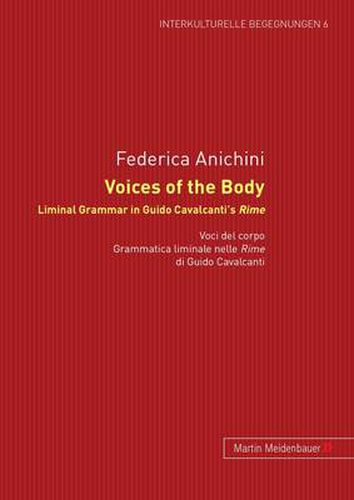Readings Newsletter
Become a Readings Member to make your shopping experience even easier.
Sign in or sign up for free!
You’re not far away from qualifying for FREE standard shipping within Australia
You’ve qualified for FREE standard shipping within Australia
The cart is loading…






This title is printed to order. This book may have been self-published. If so, we cannot guarantee the quality of the content. In the main most books will have gone through the editing process however some may not. We therefore suggest that you be aware of this before ordering this book. If in doubt check either the author or publisher’s details as we are unable to accept any returns unless they are faulty. Please contact us if you have any questions.
Guido Cavalcanti, the first thirteenth-century author to gain the reputation of an auctoritas while still alive, has been handed down by literary tradition mainly for his Canzone Donna me prega, a dense philosophical treatise about love.
This book looks at the Rime from the perspective of the ‘minor’ poems, in which Cavalcanti demonstrates his theoretical conclusion by staging the venture of a lover inescapably doomed. Mired in his sensations, the lover exemplifies an existence that falls short of the faculty of imagination, therefore of the vision of God. The terrestrial perfection available to humans also affects language. The Voices of the Body are the nonverbal signs that Cavalcanti employs to articulate a grammar that is delimited by the lover’s sensorial capacities. Federica Anichini focuses on two corporeal modes of speaking, spirits and tears. Her investigation of Cavalcanti’s lines is grounded in the pages of the most popular medical handbook of the thirteenth and fourteenth centuries, Avicenna’s Liber Canonis, as well as in the linguistic theories of the Modistae.
This study outlines Guido Cavalcanti as the forger of a special grammar that stands as a revolutionary invention in the field of poetic language.
$9.00 standard shipping within Australia
FREE standard shipping within Australia for orders over $100.00
Express & International shipping calculated at checkout
This title is printed to order. This book may have been self-published. If so, we cannot guarantee the quality of the content. In the main most books will have gone through the editing process however some may not. We therefore suggest that you be aware of this before ordering this book. If in doubt check either the author or publisher’s details as we are unable to accept any returns unless they are faulty. Please contact us if you have any questions.
Guido Cavalcanti, the first thirteenth-century author to gain the reputation of an auctoritas while still alive, has been handed down by literary tradition mainly for his Canzone Donna me prega, a dense philosophical treatise about love.
This book looks at the Rime from the perspective of the ‘minor’ poems, in which Cavalcanti demonstrates his theoretical conclusion by staging the venture of a lover inescapably doomed. Mired in his sensations, the lover exemplifies an existence that falls short of the faculty of imagination, therefore of the vision of God. The terrestrial perfection available to humans also affects language. The Voices of the Body are the nonverbal signs that Cavalcanti employs to articulate a grammar that is delimited by the lover’s sensorial capacities. Federica Anichini focuses on two corporeal modes of speaking, spirits and tears. Her investigation of Cavalcanti’s lines is grounded in the pages of the most popular medical handbook of the thirteenth and fourteenth centuries, Avicenna’s Liber Canonis, as well as in the linguistic theories of the Modistae.
This study outlines Guido Cavalcanti as the forger of a special grammar that stands as a revolutionary invention in the field of poetic language.